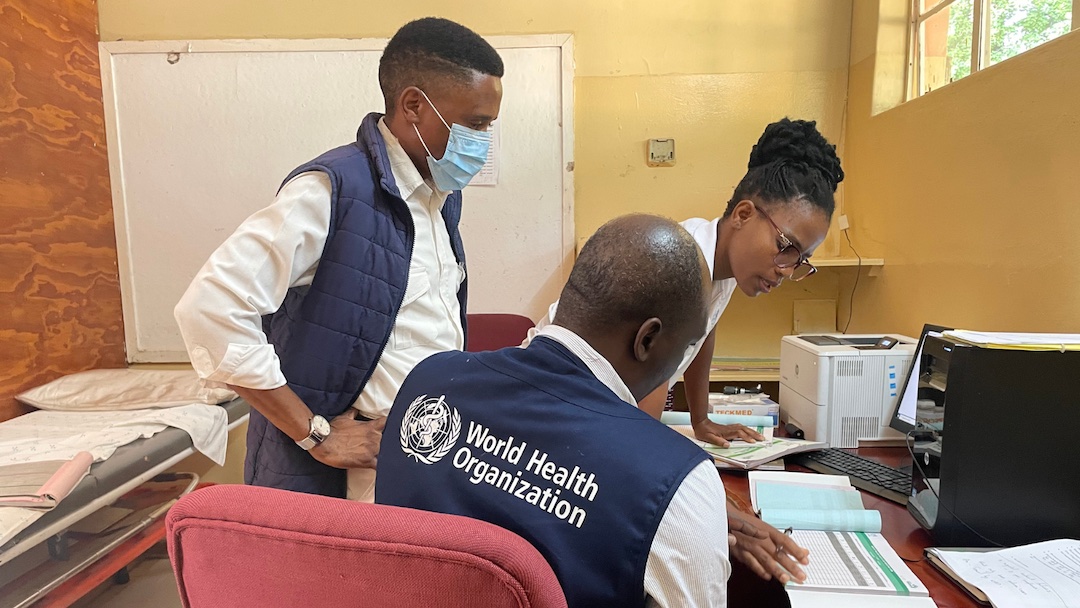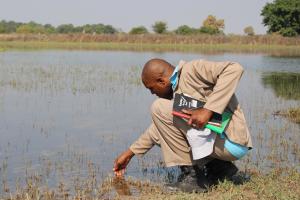Inching closer to malaria elimination
Gaborone ‒ When Obolokamang Mahupe’s son began experiencing flu symptoms, which then worsened, it was the lessons she had learnt from the malaria response team visiting her village of Kaxwi, in Botswana’s Okavango District, that helped her recognize the symptoms and seek immediate medical assistance.
Despite significant COVID-19 pandemic-related challenges, Botswana has made notable strides against malaria, achieving a 40% reduction in cases over the past 11 years. In Okavango District, which has the highest malaria incidence in the country, the total number of cases has reduced from 1193 in 2016/17, to just 198 in 2022/23.
“My son was quite ill and I was very worried, but because of the team always talking about malaria I was able to catch it in time.” Obolokamang Mahupe, resident of Okavango District
In 2020, Botswana committed to the World Health Organization (WHO)-led Malaria Elimination 2025 initiative, in which 25 countries with the potential to eliminate malaria by 2025 are receiving specialized support and technical guidance from the Organization. In Botswana, WHO has supported the elimination process by conducting a review of the malaria programme and supporting the development of the new strategic plan and related normative guidance.
In 2021, the country recorded a 93% reduction in malaria cases. This achievement resulted directly from ongoing intensified efforts to ensure access to evidence-based, targeted interventions aimed at interrupting malaria transmission, as well as eliminating the malaria parasite from the population.
“With the support of partners such as WHO, we have tackled the threat with a combination of improved surveillance and case management, combined with community engagement and concerted vector control, including Indoor Residual Spraying (IRS)” says the senior consultant in charge of primary health care at Botswana’s Ministry of Health, Dr Malebogo Kebabonye.
“WHO is committed to supporting the Government of Botswana to build on the progress that has been made towards the 2025 elimination agenda.” Dr Josephine Namboze, WHO Representative, Botswana
Okavango, with 198 malaria cases, recorded almost three times the number recorded by the neighbouring district, Ngami, during the current transmission season 2022/23. The population in this area depends on cattle rearing in cattle posts, fishing in the delta and subsistence growing of crops in fields, normally a distance from their villages. They build temporary accommodation structures which, at times are not suitable for indoor residual spraying. Given the climatic conditions and hot temperatures, villagers also spend a lot of evenings and often sleep outside, presenting a risk in continuing malaria transmission. Therefore IRS activities for 2022 reached 59%, short of the 84% target, but a good result given the district’s constraints.
For case-based surveillance, 89% of cases were notified within 24 hours and 93% were investigated; 57% of these within 48 hours. For effective and easily accessible diagnostic and treatment services, 97% of cases were treated according to national guidelines and 60% were monitored up for 28 days. The peculiarities of resurgence and rapid increase in number of cases in districts like Okavango, has had the National Malaria Programme also considering targeted mass drug administration to rapidly reduce the malaria burden, and accelerate the country towards elimination.

“WHO is committed to supporting the Government of Botswana to build on the progress that has been made towards the 2025 elimination agenda,” says Botswana’s WHO Representative, Dr Josephine Namboze. “The momentum is there, and WHO will be there to help make a final push to achieve this milestone.”
The impact of the programme is being felt by community members, according to Mahupe, who says the malaria response team covering her village has been extremely active in disseminating information about malaria and its prevention and treatment. They also conduct case response and investigation activities, distribute mosquito nets, and spray homes.
“My son was quite ill and I was very worried, but because of the team always talking about malaria I was able to catch it in time. He immediately received treatment and started feeling better,” she says.
Botswana WHO country office
Communications officer
Email: machej [at] who.int (machej[at]who[dot]int)
Media Relations Officer
WHO Regional Office for Africa
Email: dalalm [at] who.int (dalalm[at]who[dot]int)
Tel: +254 703 245 761 (WhatsApp)



